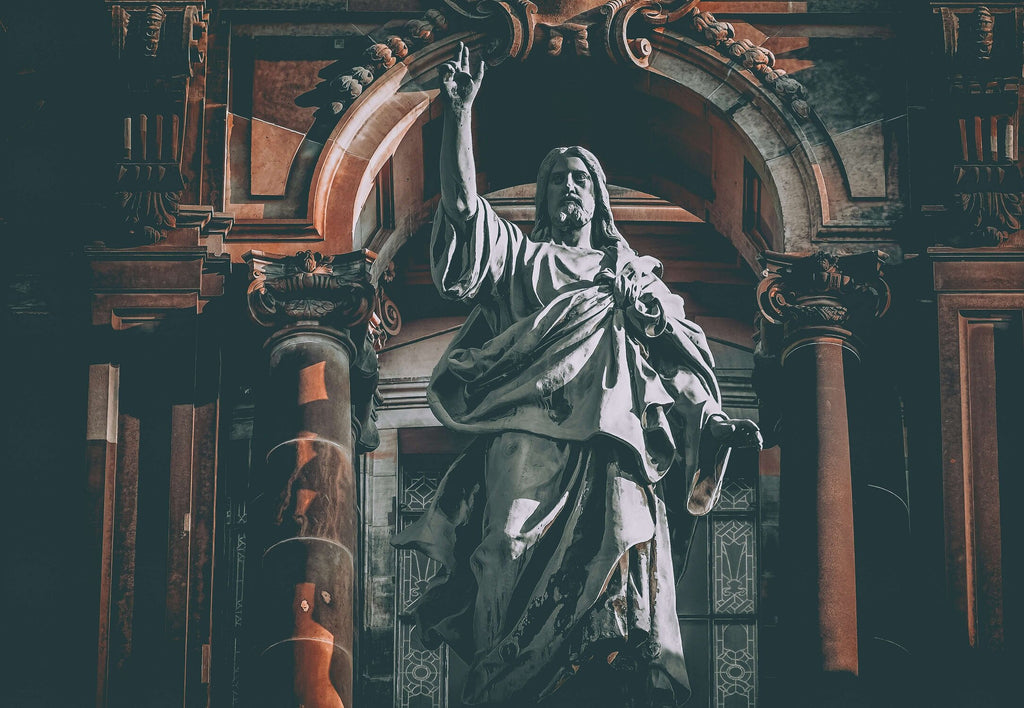What is the REAL meaning of John 11:25-26? (Deep Dive - Bible Study & Commentary)

What is the REAL meaning of John 11:25-26? (Deep Dive - Bible Study & Commentary)
Who is Jesus? This question has been the subject of theological debates, philosophical contemplation, and personal soul-searching for centuries.
To some, He is a wise teacher, imparting timeless wisdom that exceeds cultural and temporal boundaries.
To others, He is the embodiment of love and compassion, a healer of broken hearts and bodies.
Yet, believers also acknowledge Him as the very Son of God, the Divine Incarnation sent to redeem humanity from its brokenness.
The power of Jesus, whatever one's perspective, is undeniable.
It is evident from the stories of miraculous healings, turning water into wine, and calming raging storms.
His power is revealed in the way He transformed the lives of tax collectors and sinners, offering them a path to redemption and a renewed purpose.
But it's not just the extraordinary feats that reveal His power; it's the impact of His words, which have been through the ages, shaping societies and guiding souls on their spiritual journeys.
In the Gospel of John, we find a message that covers the essence of who Jesus is and His divine power.
It is in these verses of John that we discover the words of Jesus Himself, spoken with a power that surpasses time and mortality.
Here, He declares Himself as the resurrection and life.
As we explore the passage, we will discover how Jesus' power extends beyond the boundaries of our earthly existence, offering the promise of eternal life to all who put their faith in Him.
Who wrote John 11:25-26 and when was it written?
John 11:25-26 was written by Apostle John. John authored this Gospel towards the end of the first century AD, around 90–100 AD.
What is the context of John 11?
The context of John 11 centers on Jesus’ miraculous raising of Lazarus from the dead, showcasing His divine power over death.
The Gospel of John was written by Apostle John, and it is distinct from the other three Gospels (Matthew, Mark, and Luke) in both style and content.
John's Gospel is often referred to as the "Spiritual Gospel" because it emphasizes the divinity of Jesus Christ and focuses on His teachings about eternal life, love, and the relationship between God the Father and God the Son.
In the preceding chapters of John's Gospel, we see Jesus performing various miracles and engaging in teachings, all of which point to His divine nature and mission.
These miracles include turning water into wine, healing a nobleman's son, and feeding the five thousand, among others.
Each of these miracles reveals a facet of Jesus' power and compassion.
This chapter begins with the news of Lazarus falling ill. Lazarus was a dear friend of Jesus, along with his sisters Mary and Martha, and they lived in the town of Bethany.
When lazarus’ sisters sent word to Jesus about the illness of His friend lazarus, they used a simple and heartfelt plea:
“Lord, behold, he whom You love is sick” (John 11 verse 3).
This request for Jesus' intervention was not just a plea for physical healing; it was an expression of deep faith and trust in Jesus' power and love.
Mary and Martha believed that Jesus could heal Lazarus because they knew Him intimately as a friend and a divine healer.
However, what unfolds in the subsequent verses goes beyond a simple healing miracle; it reveals Jesus' power over death itself.
Jesus, upon hearing about Lazarus' illness, made a statement saying "This sickness is not unto death, but for the glory of God, that the Son of God may be glorified through it."
Here, Jesus revealed His divine perspective on the situation.
While Lazarus' sickness may have led to his physical death, Jesus knew that it would ultimately result in the glorification of God and the manifestation of His greater glory.
It may seem surprising that Jesus, who loved Martha, Mary, and Lazarus, delayed His visit for two more days.
However, this delay was intentional and purposeful.
Jesus had a greater plan in mind—a plan that would demonstrate His authority over life and death in a way that no one could have imagined.
When Jesus finally arrived in Bethany, Lazarus had already been in the tomb for four days.
Martha, upon hearing that Jesus had come, rushed to meet Him to inform Him about the death of lazarus.
Jesus, who had a special love relationship with lazarus knew it was only his physical bodies that was dead and that the death was temporal death.
The words of Martha revealed her faith in Jesus' healing power but also expressed her grief and perhaps a hint of disappointment.
She said, “Lord, if You had been here, my brother would not have died.” (John 11 verse 21)
Mary also repeated the same statement in John 11 verse 32,
“Then, when Mary came where Jesus was, and saw Him, she fell down at His feet, saying to Him, “Lord, if You had been here, my brother would not have died.”
Further in this message, we saw an exchange between Martha and Jesus.
Martha, despite her initial expression of disappointment, demonstrated her faith in Jesus.
She acknowledged that whatever Jesus asked of God, God would give Him. She said to Him,
“Yes, Lord, I believe that You are the Christ, the Son of God, who is to come into the world.”
Jesus was deeply moved by the sorrow of those around Him.
He wept. These two simple words, "Jesus wept,” remind us that Jesus, despite His divinity, fully embraced the human experience, including the pain of loss and grief.
The climax of this remarkable chapter is the resurrection of Lazarus.
Jesus, despite the doubts and concerns of those present, ordered the stone to be removed from the tomb.
Martha, ever practical, reminded Jesus of the inevitable stench that would accompany a decomposing body after four days.
Jesus, undeterred, reinforced the importance of faith.
He said, “Did I not say to you that if you would believe you would see the glory of God?”
He offered a prayer of gratitude to the Father to demonstrate to the witnesses that His power and authority were derived from God the Father.
Then, with a loud voice, Jesus called out, "Lazarus, come forth!"
And the impossible happened—Lazarus, who had been dead and bound in grave clothes, emerged from the tomb, restored to life.
This miraculous event not only revealed Jesus' authority over death but also foreshadowed His resurrection.
Therefore, this is a passage filled with great spiritual truths and insights.
It reminds us of the depth of Jesus' love, compassion, and power.
It shows us that even in the face of death and despair, faith in Christ can bring about eternal hope and unimaginable miracles that guarantee new life.
This chapter challenges us to trust in Jesus' timing and sovereignty, even when it seems that He is distant or delays His intervention.
he most important thing to note in the context of salvation and the main reason behind salvation is faith.
“For God so loved the world that He gave His only begotten Son, that whoever believes in Him should not perish but have everlasting life.” ( John 3:16)
Our journey as believers starts with faith, and we must continue with same if want to make the most of our journey with Christ in the distant future.
Throughout the old testament and in the new testament we saw great men and women of faith and how they command exploits.
To make the most of our spiritual life we must be a man and woman of faith.
Our religious leaders should teach the subject in most of our services, especially at this end of time.
What is the message of John 11:25-26?
The message of John 11 verses 25 to 26 focuses on the promise of eternal life and the benefit of faith and belief in Jesus.
The opening words of Jesus in this verse are nothing short of extraordinary.
He said, "I am the resurrection and the life."
In this single statement, Christ unveils the core message of Christianity—hope, redemption, and eternal life.
Let's dissect this message in the context of our lives today.
It is important to note that the subject of resurrection has different meanings.
The first resurrection, Jesus’ resurrection involves the death of the body which is the general resurrection and the most commonly understood.
It is the rising of Jesus from death after the third day. What Jesus is referring to in this message is the spiritual resurrection of believers, not bodily resurrection.
The first message is eternal life through faith.
Christ says, “He who believes in Me, though he may die, he shall live.”
These words are a source of immense comfort to us.
They remind us that death, though inevitable in the physical realm, does not spell the end for believers.
Instead, it is a transition to a better life, which is eternal. This promise is not reserved for a select few but is extended to all who put their faith in Jesus Christ.
Hence, as believers, we should know that our physical death is not the end but a doorway to the eternal life Jesus offers.
We should live with the assurance that our belief in Christ connects us to a reality beyond the confines of this world.
However, there is the clause of faith, which is the second message of the passage.
Jesus further said, "And whoever lives and believes in Me shall never die."
This statement is both an invitation and a requirement.
It teaches us to not only believe in Jesus but also to live according to that belief.
Living in faith means surrendering our lives to Christ, allowing Him to transform us from within.
It means abiding by His teachings, emulating His character, and pursuing a life of righteousness.
The story of the rich young ruler in Matthew 19 verses 16 to 22 serves as a reminder of the importance of living by our faith.
Despite his sincere inquiry about eternal life, the rich young ruler was unwilling to let go of his worldly possessions.
Jesus said to him, “If you want to be perfect, go, sell what you have and give to the poor, and you will have treasure in heaven; and come, follow Me.”
Jesus' response highlights the challenge of living out one's faith when attached to materialism.
To truly live and believe in Christ is to place Him above all else, trusting that His ways lead to eternal life.
The third message of the verses teaches the concept of eternal death, which is the consequence of unbelief in Jesus.
Jesus asked sister of lazarus, Martha, "Do you believe this?" In this simple question, Jesus compelled her to examine the depth of her faith.
Similarly, this question demands a response from every believer today.
Do we genuinely embrace Jesus as our Lord and Saviour?
If so, why do doubts sometimes cloud our trust in His divine plans?
Why do impatience and frustration arise when our desires aren't immediately fulfilled?
If our faith in Jesus is steadfast, we should be willing to wholeheartedly surrender to Him and have faith in His loving plans, even when the realization of our heartfelt desires remains unseen.
What are the Consequences of Belief and Unbelief in Christ?
Belief or faith in Christ leads to eternal life, while unbelief leads to eternal death.
Rejecting Christ means choosing a path that leads to spiritual death—eternal separation from God.
This separation is what the Bible often refers to as "eternal death" or "the second death." Revelation 20 verses 14 to 15 portrays this fate:
“Then Death and Hades were cast into the lake of fire. This is the second death. And anyone not found written in the Book of Life was cast into the lake of fire.”
The lake of fire symbolizes the eternal separation from God, a destiny that no one should willingly choose.
It is a reminder of the eternal consequences of unbelief in Jesus.
While the consequences of unbelief are dire, the choice of belief brings immeasurable blessings.
Believing in Jesus Christ not only ensures eternal life but also ushers in a transformed life on earth.
It is a choice that brings hope, purpose, and a deep sense of fulfilment.
The story of the thief on the cross in Luke 23 verses 39 to 43 illustrates the redemptive power of belief, even at the eleventh hour.
In his dying moments, this repentant thief turned to Jesus, believing in Him as the Lord. Jesus' response was, "Assuredly, I say to you, today you will be with Me in Paradise,"
This explains the immediacy of the reward for genuine belief.
Hence, our faith in Jesus Christ is the bedrock of our Christian journey.
It is through this faith that we receive the promise of eternal life. Therefore, nurturing and strengthening our faith should be a daily endeavour.
Christ the resurrection and eternal life
Eternal life is God’s divine promise offered to humanity and manifested through Jesus’ death and resurrection.
It is a life that transcends the temporal boundaries of our earthly existence, assuring us of an everlasting relationship with God.
To understand this promise, let us turn to the book of Romans.
Romans 6 verse 23 states, “For the wages of sin is death, but the gift of God is eternal life in Christ Jesus our Lord.”
This verse emphasizes the contrast between sin's consequence, which is death, and God's gracious gift, which is eternal life through Christ.
Eternal life is received as a gift from God. It is made possible through our faith in Jesus Christ, who conquered sin and death through His resurrection.
The foundation of our faith is rooted in the resurrection of Jesus Christ.
Matthew 28 verses 5 to 7 recount the angel's message at the empty tomb of Jesus:
“But the angel answered and said to the women, 'Do not be afraid, for I know that you seek Jesus who was crucified. He is not here; for He is risen, as He said. Come, see the place where the Lord lay. And go quickly and tell His disciples that He is risen from the dead…”
This moment in history marked the triumph of Christ over death.
His resurrection is the ultimate proof of His divinity and the promise of eternal life for all who believe in Him.
Christ's resurrection not only secures our eternal life but also empowers believers to experience a transformed life here on earth.
Romans 8 verse 11 declares, “But if the Spirit of Him who raised Jesus from the dead dwells in you, He who raised Christ from the dead will also give life to your mortal bodies through His Spirit who dwells in you.”
Through the indwelling of the Holy Spirit, we are granted the power to live victoriously over sin and to experience a foretaste of eternal life.
This power enables us to walk in righteousness and bear witness to Christ's resurrection in our daily lives.
Hence, the hope of resurrection is a source of comfort and assurance for believers, especially in times of loss and sorrow.
1 Thessalonians 4 verses 13 to 14 says, “But I do not want you to be ignorant, brethren, concerning those who have fallen asleep, lest you sorrow as others who have no hope. For if we believe that Jesus died and rose again, even so God will bring with Him those who sleep in Jesus.”
This passage reminds us that our hope is not in vain.
Just as Christ conquered death through His resurrection, so too will He bring believers who have passed away into His eternal presence.
A relevant story that buttresses the resurrection of Christ is the encounter on the road to Emmaus.
In Luke 24 verses 13 to 32, two disciples, Cleopas and another, were walking to Emmaus on the day of Christ's resurrection.
They were saddened by His crucifixion and had lost hope.
However, as they walked, Jesus Himself joined them on the journey, though they did not recognize Him.
During their conversation, Jesus explained the Scriptures and the prophecies concerning His death and resurrection.
It was only when they broke bread together that their eyes were opened, and they recognized Him.
This encounter with the risen Christ changed their despair into hope and renewed their faith.
Just as Jesus revealed Himself to Cleopas and the other disciples, He continues to reveal Himself to us through the Scriptures and His presence in our lives.
His resurrection brings hope and renewal to all who encounter Him.
As believers who already have this knowledge of truth, are we just to keep it to ourselves?
In Matthew 28 verses 18 to 20, the Great Commission empowers us as believers to share the good news of Christ's resurrection and the promise of eternal life with a world in need of hope and redemption.
It is through this mission that the power of Christ's resurrection continues to touch lives and bring souls into the eternal fold.
How do I apply John 11:25-26 to my Life?
Applying the teachings of John 11 verses 25 to 26 involves being an ambassador of Christ and having assurance in the promise of eternal life.
To apply this passage, you must begin by embracing Jesus as the source of your life.
Just as a branch draws nourishment from the vine, you should abide in Christ daily, seeking your spiritual sustenance from Him.
Every morning, as you wake up, take a moment to surrender your day to Christ.
Invite Him to be the source of your strength, wisdom, and joy.
Acknowledge your dependence on Him, just as the Israelites depended on Manna in the wilderness (Exodus 16 verses 14 to 15).
In doing so, you allow the resurrection and life to flow into every aspect of your daily existence.
When you face insurmountable challenges, remember the story of David and Goliath (1 Samuel 17).
Just as David trusted God to defeat the giant, you can trust Christ to bring victory out of your difficulties.
Pray for His guidance and strength, and He will lead you through the darkest valleys, just as He led the Israelites through the Red Sea.
The assurance of eternal life in Christ should infuse every moment of your earthly existence with purpose and meaning.
Consider the life of Mary, who anointed Jesus' feet with costly perfume (John 12 verse 3).
Her act of devotion was an acknowledgment of Christ as the source of eternal life.
In your everyday life, seek opportunities to serve others, just as Jesus washed the disciples' feet.
Live with the awareness that your actions can reflect the eternal life you have in Christ.
Also, share the message of salvation with those who haven't yet encountered the resurrection and life, just as the Samaritan woman shared her testimony (John 4 verses 28 to 30).
Your life's purpose should be rooted in glorifying Christ and leading others to Him.
Additionally, cultivate an eternal perspective. Apostle Paul reminds us in 2 Corinthians 4 verses 17 to 18,
“For our light affliction, which is but for a moment, is working for us a far more exceeding and eternal weight of glory.”
Every challenge and triumph in this life is preparing us for eternity.
Likewise, to truly live out the message, cherish your fellowship with Christ.
In the Gospel of John, we see a recurring theme of intimacy between Jesus and His disciples.
Just as He dined with His disciples in the upper room, He desires to have a close, personal relationship with you.
Set aside time daily for prayer and meditation on God's Word.
Like Mary, choose the "better part" of sitting at Jesus' feet and listening to His teachings.
Develop the habit of seeking His guidance and His presence in your life.
It is through this intimate fellowship that you will experience the fullness of the resurrection and life.
By applying these teachings, you will be on the path to enjoying the gift and the promise of eternal life through Christ.
What is John 11:25-26 prayer?
Heavenly Father, In the midst of life's uncertainties, I come before you with a heart filled with gratitude and faith.
I thank you for the words of your Son, Jesus, as found in this passage.
Lord, you are the resurrection and the life, and in you, I find my hope and eternal security.
I trust in your promise that whoever believes in you, even though they may face physical death, will never truly die but will live eternally with you.
It is in this assurance that I find comfort and peace, knowing that you are the source of life eternal.
Help me to deepen my faith in you, not only in times of trouble but in every moment of my life.
May I cling to your promise of eternal life, finding solace in the knowledge that death does not have the final say.
Grant me the wisdom to live my days on earth by your teachings, spreading love, compassion, and the message of your salvation to all those I encounter.
Let your light shine through me so that others may come to believe in you as the true source of life and the way to everlasting joy. This I pray in Jesus’ name,
Amen.
Conclusion
As we have journeyed through these verses, we discovered that faith in Christ is not merely a matter of words and confession.
It's a living, breathing relationship that manifests in our deeds and actions.
Our belief in Jesus should exceed lip service; it should transform our lives.
Our religious leaders have greater tasks for our people today. They must not cease preaching eternal life.
For believers, this message serves as a reminder and a call to action.
We are called to live out our faith daily, not only professing it but demonstrating it with our deeds.
Our love for others, our kindness, our compassion—all of these are reflections of the love Christ has poured into our hearts.
In Matthew 5 verse 16, Jesus encourages us further, saying,
“Let your light so shine before men, that they may see your good works and glorify your Father in heaven.”
Our actions should point others to Christ, drawing them into the same life-giving relationship we cherish.
To those who may be reading these words and have not yet placed their trust in Jesus, this message extends a heartfelt invitation.
It calls you to consider the promise embedded within these verses—the promise of resurrection and eternal life.
In Revelation 3 verse 20, Jesus stands at the door and knocks, saying,
“If anyone hears My voice and opens the door, I will come in to him and dine with him, and he with Me.”
He longs for a relationship with you, not one based solely on words but on a living faith.
May our lives be a testimony to the reality of the words of this passage.
SHARE:






















